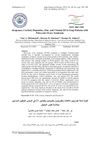TLDR PCOS and eating disorders are linked by hormonal imbalances, needing personalized treatment.
This literature review examines the intricate relationship between polycystic ovary syndrome (PCOS) and eating disorders (EDs), focusing on hormonal imbalances involving serotonin, leptin, insulin, ghrelin, kisspeptin, and cortisol. These imbalances contribute to the development of EDs, such as bulimia and binge eating, in women with PCOS. The review highlights that serotonin deficiency and leptin fluctuations are linked to mood and eating disorders, while elevated kisspeptin and hyperinsulinemia worsen hormonal dysregulation. The bidirectional relationship between PCOS and EDs suggests the need for a multidisciplinary treatment approach, early identification, and personalized interventions. Future research should aim to clarify the hormonal mechanisms to improve treatment strategies and quality of life for women with PCOS.
 5 citations
,
October 2022 in “Heliyon”
5 citations
,
October 2022 in “Heliyon” Polycystic ovary syndrome, a disorder causing menstrual issues and infertility, can be treated with lifestyle changes, medication, herbal remedies, surgery, and assisted reproductive techniques like artificial insemination and IVF.
 3 citations
,
October 2021 in “Postepy Dermatologii I Alergologii”
3 citations
,
October 2021 in “Postepy Dermatologii I Alergologii” Checking the chin, thighs, upper lip, or lower abdomen is enough to predict hirsutism.
 1265 citations
,
October 2013 in “The Journal of Clinical Endocrinology and Metabolism”
1265 citations
,
October 2013 in “The Journal of Clinical Endocrinology and Metabolism” The guideline suggests using specific criteria to diagnose PCOS, recommends various treatments for its symptoms, and advises screening for related health issues.
 1514 citations
,
December 2011 in “Fertility and sterility”
1514 citations
,
December 2011 in “Fertility and sterility” Experts agree that PCOS affects women's health in complex ways, but more research is needed to understand and treat it effectively.
 131 citations
,
August 2004 in “Best Practice & Research in Clinical Obstetrics & Gynaecology”
131 citations
,
August 2004 in “Best Practice & Research in Clinical Obstetrics & Gynaecology” The conclusion is that PCOS is caused by ovarian sensitivity to hormones and disrupted hormone control, possibly due to ovarian factors, and more research is needed.
 249 citations
,
November 2003 in “Clinical endocrinology”
249 citations
,
November 2003 in “Clinical endocrinology” Insulin resistance is a key factor in polycystic ovary syndrome, but genetics may also contribute.
24 citations
,
May 2022 in “Frontiers in Endocrinology” Activating brown fat may help manage PCOS symptoms.
 369 citations
,
June 2013 in “Biochimie”
369 citations
,
June 2013 in “Biochimie” Myo-inositol supplements may improve insulin sensitivity and help with conditions like PCOS and gestational diabetes, but more research is needed.
 February 2025 in “Iraqi Journal of Science”
February 2025 in “Iraqi Journal of Science” PCOS patients have higher LDH and lower cortisol, dopamine, zinc, and vitamin D3, which may contribute to their symptoms and obesity.







